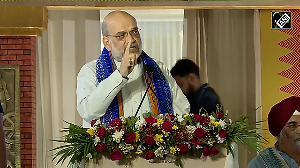'I told myself, I will be 23 next year. Why can't I be a billionaire too?'
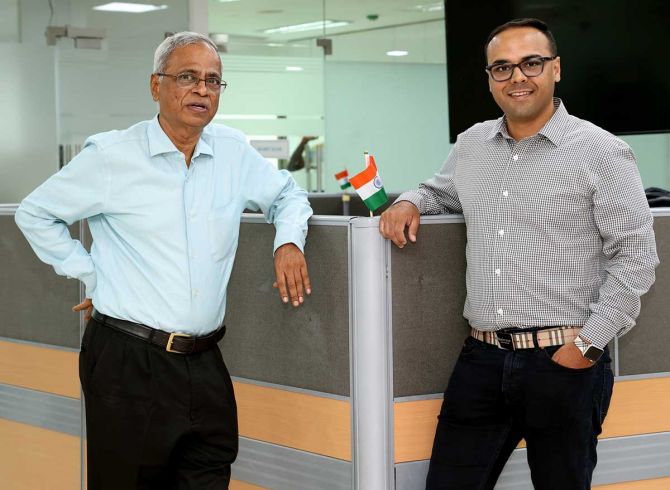
Way back in 1997 when Rediff.com's Shobha Warrier first interviewed Professor Ashok Jhunjhunwala on the Wireless in Local Look technology he had invented along with his research team, there was an Incubation Cell next to his room where young students experimented with their innovative ideas.
Those were the days when the phrase 'start up' was not in vogue.
By 2002, Professor Jhunjhunwala had incubated 8-9 companies and around 500 engineers worked with him in those companies, a quarter of them his students.
Like many youngsters, Umesh Sachdev and Ravi Saraogi, two engineering students from Delhi, met Professor Jhunjhunwala with dreams to be entrepreneurs.
In 2006, after they finished their education, they came to Chennai and later the professor helped them launch Uniphore, a voice technology company.
When the IIT Madras Research Park came into existence in 2010, the first of its kind in India, the first start up to set up its office there was Uniphore.
Today, it is a Unicorn! A billion dollar company.
It was one journey that was full of ups and downs, like any other start up. But both Umesh and Ravi never gave up.
In this exclusive chat with Shobha, Professor Jhunjhunwala and Umesh Sachdev, CEO of the billion dollar Uniphore speak about their journey.
Professor, what gave you the confidence to invest your time on Umesh and Ravi when they came to meet you as students?
Professor Jhunjhunwala: They were computer science students in Delhi when I first met them.
When they told their professor, Professor Farooqui that they wanted to do a start-up, he asked them to write to me.
Because Professor Farooqui's name was mentioned in the mail, I asked them to meet me when I went to Delhi next.
I asked them to hop into my vehicle at the airport and talk to me while we travelled.
As I would be going to several meetings, they could spend time with me the whole day. And we had at least three hours of talking that day!
In the second meeting, they came with the idea of tracking a stolen telephone and I could point out enough loopholes in it.
But I told them that if they were serious about becoming entrepreneurs, they would come up with more ideas.
We met two more times in Delhi. By then, I also got the impression that they were serious.
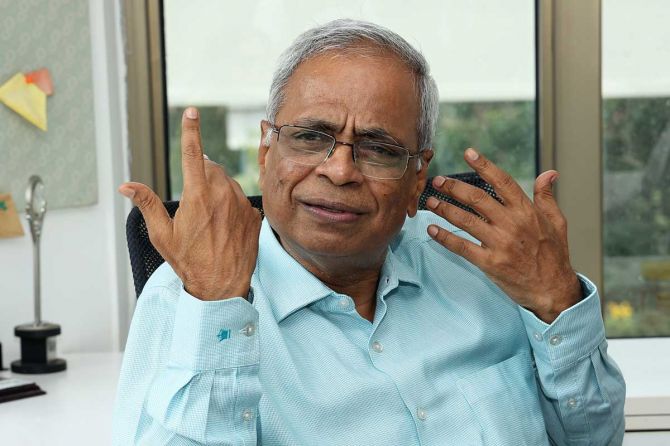
Did you agree to meet them three times because they were passionate about the idea of becoming entrepreneurs?
Professor Jhunjhunwala: Yes. They were serious and passionate.
Almost a year-and-a-half passed, and one day I got a mail from them that they were about to graduate. Though they got some fantastic job offers from companies, they were still interested in doing a start-up.
By this time, we got to know each other well, but I was still not sure what they could do.
I told them, "If you are really serious about a start-up, come to IIT Madras, I can give some living wages which is low.
"When you are here, I will teach you some things and in a year's time, I will help you set up a venture."
Why did you decide to help them?
Professor Jhunjhunwala: I do this for several people. Of course, not everybody who come to me.
What do I look at before choosing?
One, Are they serious and passionate?
Two, Do they understand failures?
In fact, I even ask them, How many times you are scolded?
Can you get up when you fall down?
I wanted to find out whether they were ready to take harsh criticism. Because the market is the harshest critic of whatever they do.
Let me ask you Umesh, why did you decide to meet Professor Jhunjhunwala? Only because your professor asked you to?
Umesh: Professor Farooqui told us, "If there is somebody in India who has been successful in working with young people and incubating companies, it is Professor Jhunjhunwala."
He was also a member of the grant committee, and when another member who came to know that I was meeting the professor, she said in Hindi, 'Tumhari life ban jayegi.'
He was incubating companies, he was on the boards of many telecom companies, and also an advisor to the government. So, the person to go to was Professor Jhunjhunwala.
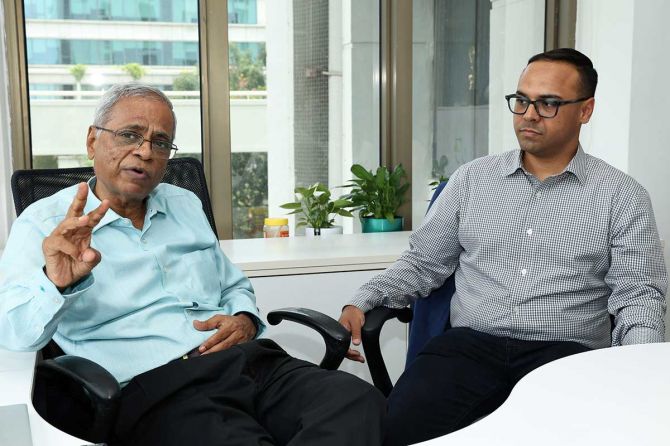
Why did you want to become entrepreneurs?
Umesh: When we were second year students, our idea was selected as one of the top three in the world in a competition, and we were invited to Paris.
We had a sponsored trip to Paris and the organisers gave us a software development kit worth hundreds of dollars.
When we were in the third year, we made the same idea into a business plan for a competition by Intel, and we were placed in the top 3 in India.
They sent our plan to a global competition at UC Berkley. We got a chance to visit UC Berkley, and sit with the Silicon Valley VCs for the first time in our lives.
That was when we decided to have our own start-up!
These successes made us decide to pause a career, MBA, etc and try entrepreneurship.
At that time, our contemporaries were either doing an MBA or taking up jobs with salaries we could also have got.
There was definitely peer pressure. But I must say, our families were extremely supportive. There was not even a discussion on job vs entrepreneurship.
For us, it was an opportunity to create something big.
When we came to IIT Madras, somebody showed me a magazine with Mark Zuckerberg on the cover, and it was written Billionaire at 23.
I told myself, I will be 23 next year. Why can't I be a billionaire too?
So, you can say we came here with twinkle in our eyes!
Professor Jhunjhunwala: This has become a formula in creating good entrepreneurs. Create excitement in the college.
We are trying to do that not just at IIT Madras, but in 10-15 universities across South India. Then, we follow the Lego model, by making the students build on the ideas.
When they come here with twinkle in their eyes, we give them really hard time.
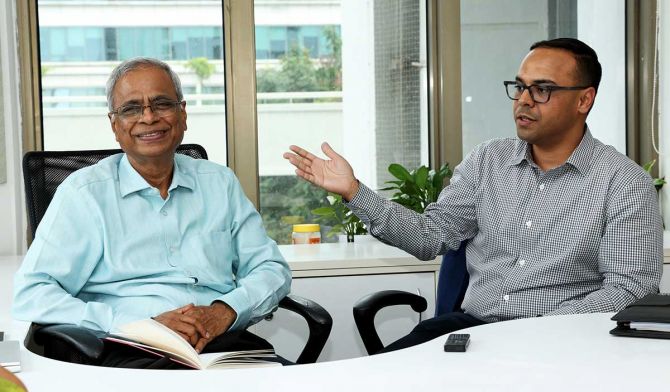
What kind of hard time did the professor give you?
Umesh: After many years, the other day I drove with him to the campus. I wanted to go to the labs where our journey began.
There is a corridor there, and his room is almost in the middle. If you enter the corridor from either side, you could hear him yelling at someone.
We used to call it the Corridor of Death! (laughs)
Professor Jhunjhunwala: Yes, I did give them a real hard time.
For example, when I saw a kind of laxity in them after they got their first funding, I called them to my room.
I closed the door and went on and on for two hours.
I told them, "Somebody had faith in them, and they invested their money in your project. You cannot destroy the faith as it will impact not only you but the others who come after you too."
Finally, I told them, "If you fail, you have to return the money personally."
If I remember correctly, I made them sign a paper too.
It was there in my drawer, and I tore it up after two years when I was sure that they would make it!
After that, I never saw laxity in them.
They were just 25 year olds. I had to be harsh on them at that time.
I am not a professional incubator or a mentor.
I am a teacher, and I was taking care of my children, my students.
Umesh: Not just Ravi and I, many others of our age, when we come here, we didn't have any business experience or working in a corporate sector; we were just amateur entrepreneurs.
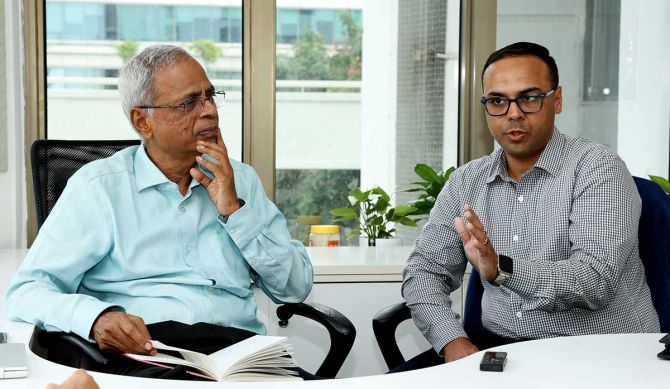
You only had dreams?
Umesh: Yes, just dreams and no idea about real work as entrepreneurs.
We even had no idea how to manage investor's money at that time.
So, the hard time he gave us and the philosophy behind it really worked, not just for us but for others too.
We understood that here was a mentor who cared deeply enough to go out of his way to make sure that we would not reach a stage from where it would be too late to come back.
He taught us a big lesson then; that even though it was an equity investment, what was at stake was our reputation and the trust they had put in us.
If we lost it at that stage, how would we raise more money in future?
Did the hard time continue for many days and months?
Umesh: It was not just days or months, it was throughout!
After 3 or 4 years, when he saw that our company had investors and a real board, he started to disengage.
He told us, what I am doing is like when your kids become teenagers, you have to them go.
But until then, he was involved with us almost every day either by email or phone calls, checking the technology development, business development, whether the customer paid us or not.
He was involved with every aspect of the company.
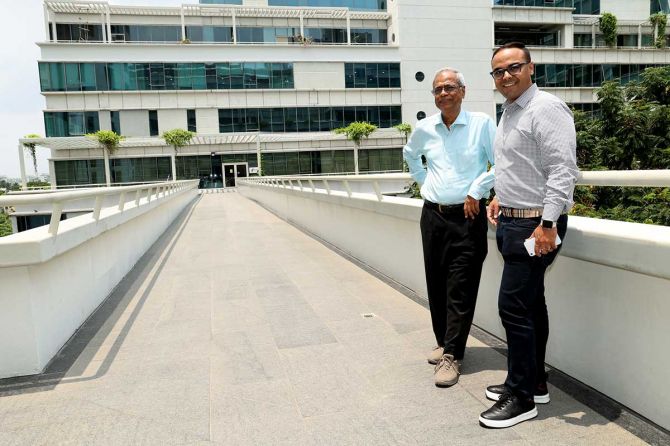
Were they real learning experiences for you two when you started out?
Umesh: All of them. The uniqueness of this incubator at IIT Madras is that the DNA of the companies coming out is innovation.
You had suggested many ideas in the beginning to Professor Jhunjhunwala. How did you zero in on this idea?
Umesh: Statistically, Ravi and I knew that the chances of our success are 1 out 10 as 9 out 10 start-ups fail.
When we got convinced that the first idea we were working on -- the mobile location app service -- would not succeed, we decided to move on.
We had already spent two years working on the first one, but didn't reach anywhere. Meanwhile, our friends were sending us messages on how well they were doing in their jobs.
Out of the several ideas we had, we decided on the speech recognition one, knowing very well that if it succeeded, it would impact millions of lives and also would fetch millions of dollars.
In 2007-2008, nobody in the world had built a multi-lingual speech recognition app when we at Uniphore did it. Even Apple Siri had not come out with the English speech recognition program then.
And here we were, two young engineers with a small team and shoestring budget building a program for multiple Indian languages!
The constant I started working on was the knowledge that 70% of India, which is 700-800 million people, were in the Tier 2cities or in the villages and Internet access was limited for them. And they also browse on the mobile phones more.
In 2007, there were no smart phones too.
So, to bridge the digital divide, they will have to use voice and that too in Indian languages.
We felt, if we were to able build a voice interface, then the value added services we can enable for rural and semi-urban population were many.
So, it was not just an app, we were thinking of the economic revolution behind the idea.
That was why we zeroed in on this idea.
Professor, did you expect this kind of a success for them in the beginning?
Professor Jhunjhunwala: This level? No. I did expect them to succeed but they have gone far beyond my expectations.
Now, they are a $2.5 billion valuation company.
Now, I see tremendous amount of maturity in them.
I also saw continuous learning in them. They look at every minute detail of the company and that's what I admire about them.
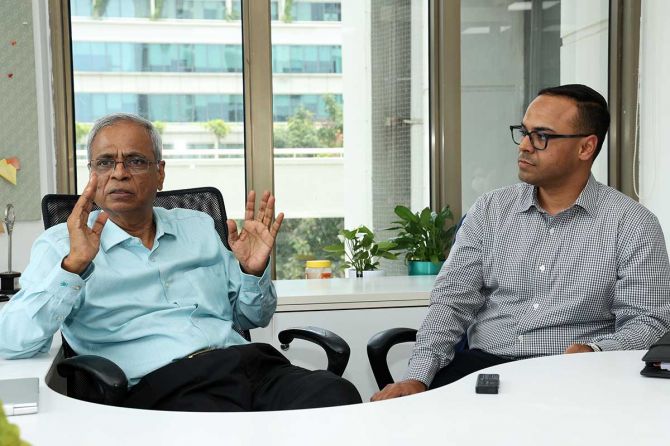
9 out of 10 start ups fail. Umesh, were you afraid of failure?
Umesh: The latest success is only recent. We have been here for 14 years, and we have gone through many ups and downs.
We have seen a couple of near-death experiences.
We had cycles where funding had dried up. But at no point, Ravi or I feared failure.
I often tell younger entrepreneurs that there is only one condition for a start-up to fail; and that is not money drying up or customers pulling out.
That happens only when founders give up.
But Ravi and I had decided that no matter what happens, good or bad, we would be each other's strengths even if we were the last employees left.
You spoke of near-death experiences. How did you come back alive?
Umesh: I will give you an example.
When we got a big funding in 2015 to help us go international, but the condition was that we use SaaS for selling.
SaaS was a new concept then and the investors wanted us to convert our business to subscription.
At that time, we were generating revenue and were profitable.
As soon as we converted to SaaS, for six quarters, we went to zero revenue.
What we thought was simple was not simple; we had to redo the company inside out. We almost ran out of money.
Luckily, once the SaaS model worked, we were back on our feet again!
Even in those six quarters, there wasn't a moment when Ravi and I thought of doing something else. It was never in our thoughts.
We had decided, even if we were the last two, we would rebuild the company.
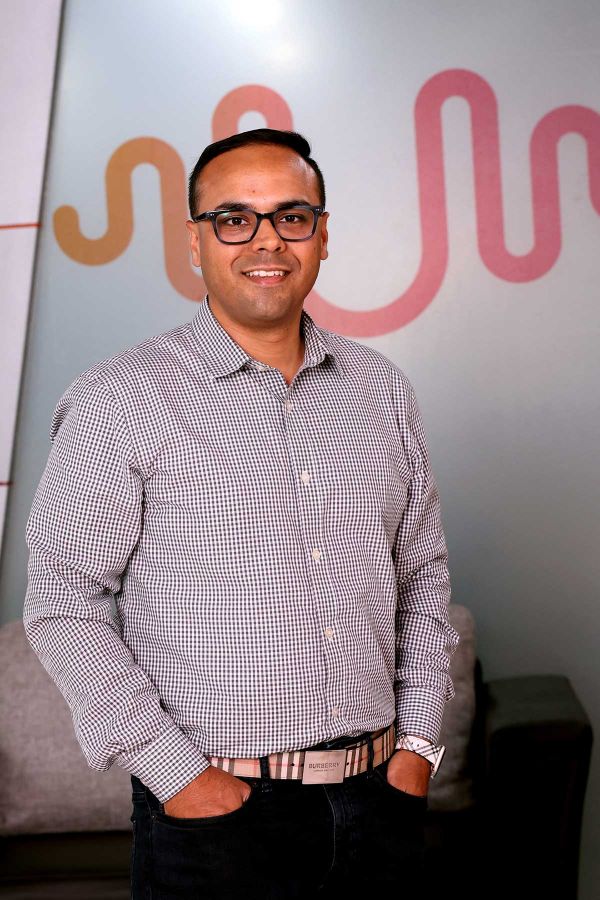
How big is becoming a billion dollar valuation company, the unicorn status?
Umesh: When we had crossed the $100 million valuation, I called Professor and he congratulated me.
Do you know what he said?
"The day you cross £100 million revenue, I will be more impressed."
So, today we have this $2.5 billion valuation, and it is good for our business. But my feeling is, to impress him, I have to get $2.5 billion revenue!
I like that push.
So, every time you achieve something, he pushes you further?
Umesh: Yes, never let us be complacent.
Professor Jhunjhunwala: I took a back seat when they got strong investors who are more equipped to guide them.
We are only incubators, and we know only how to take a start -up to a certain level.
In what way will the unicorn status change your company?
Umesh: What it does to a company like ours is, it gives us tremendous market validation.
Customers feel more confident working with a company of our size.
Our ability to gather bigger volume of business has become very high today.
Anywhere in the world, the biggest war today is on talent.
Whether it is Silicon Valley or India or Israel or Europe, our ability to attract and retain people went up as soon as the billion dollar announcement came.
Not just valuation, we also raised $400 million funding which is helping us fire multiple engines.
We are not a tiny start-up we used to be. Today, we have customers in 17 countries.
We have more than 800 employees across different continents; in the US, in India, Europe and Israel.
To maintain this growth rate, we are geographically expanding and adding new products.
We used to be known as a strong voice company but during the covid times, we started research in the area of facial emotions.
We also did four acquisitions in the last 15 months.
Was this your dream when you started Uniphore with Ravi?
Umesh: I am 36 now. I came here when I was 21.
A few years ago, I was talking to my other mentor John Chambers of Cisco.
We were flying from India to the US in his plane and he asked me, "Umesh, what do you want to do with this company?"
I said, "John, I want to be like you. I want to leave a legacy like you.
"You will be remembered for building Cisco.
"You built a large institution that will outlive you."
He said, "I like that vision.
"Had you said, I want to sell, I would not have been happy still I would have helped you."
So, to answer your question, each time we reach the goal we set, the goal post moves up.
My promise to Professor is, we will be the first $10 billion company out of this incubator! But I promise that won't be the end of it.
Do you feel the company is more like a child to you?
Umesh: I have two children; an 8-year-old daughter and a 4-month-old son.
I tell my daughter; you are not my first child. My first child is Uniphore!
You cannot take that sentiment away from a founder.
Feature Presentation: Ashish Narsale/Rediff.com










